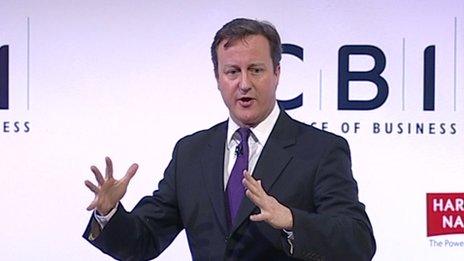Economy - 'We are well behind'
- Published
- comments
Call it candour, call it expectation management, call it what you like. The prime minister's words to the business lobbying organisation the CBI today were striking: "We are well behind where we need to be."
He added: "Getting debt under control is proving harder than anyone envisaged. High levels of public and private debt are proving to be a drag on growth... which in turn makes it more difficult to deal with those debts."
These are the words of a man preparing the way for the publication of economic forecasts by the OBR - the Office for Budget Responsibility - next week.
We all know that growth will be much lower than forecast. We all know that borrowing will be much higher. What we don't know - but the chancellor and the prime minister should by now - are the numbers or the tone of the commentary that will accompany them.
Even allowing for the increased cost of welfare as unemployment goes up, the so-called automatic stabilisers, and meeting borrowing targets in five years not four, the OBR could declare that the chancellor is well off course. Unlike any previous chancellor, George Osborne could not re-write that independent warning.
So he and his boss have been preparing for the worst...
UPDATE 6pm: The chancellor has received the OBR economic forecasts which will be unveiled next week on the same day as his Autumn Statement.
I'm told that the OBR's report will give a percentage probability that the government will meet its deficit targets - in the jargon, its "medium-term fiscal mandate" which, to remind you, is "to balance the cyclically-adjusted current budget by the end of a rolling, five year period", and a supplementary target "to see public sector net debt falling in 2015-16".
In March, after the Budget, the OBR concluded that, external:
• our central forecast suggests that the government has a greater than 50% probability of meeting both these targets under current policy
And
• there is a roughly 70% chance of the government meeting the mandate under current policies.
This was prefaced with the crucial sentence: "If our forecasts are as accurate as past Budget and Pre-Budget Report forecasts." They are, of course, unlikely to be.
Economists tell me that the key to that vital probability number is their measure of so-called "spare capacity in the economy" - in other words, how much of the drop in output is a permanent impact of the banking crisis and how much is temporary. If the OBR decides there is less spare capacity than they originally thought, there would be less scope for growth to help erode the deficit, which could mean that the government would miss its deficit targets.
The political question then would be - does George Osborne simply accept that it will take longer to cut the deficit beyond the next election, or announce more spending cuts and more tax rises?
UPDATE 22 November: Will he or won't he miss his deficit target? There's been much speculation about what the Office for Budget Responsibility will say next week. My colleague Stephanie Flanders explains on her blog how the numbers might be calculated and the targets met but Labour have dug out a quote from the Prime Minister which gives him much less wiggle room:
"In five years' time, we will have balanced the books.
"The sharp tax rises and huge interest rates you feared, the uncertainty you felt - these are things you no longer need to worry about.
"With our Budget in June and the Comprehensive Spending Review last week, we took Britain out of the danger zone."
David Cameron, speech to CBI conference, 25 October 2010,, external
- Published21 November 2011
